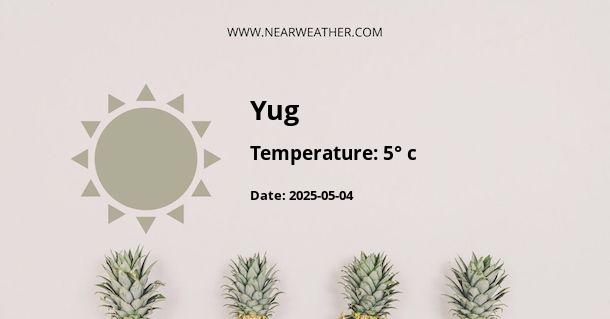Climate and Weather in Yug, Russia
Yug, also known as Yugorsk, is a city located in the Khanty-Mansi Autonomous Okrug region of Russia. Situated in the heart of Siberia, Yug experiences a subarctic climate characterized by long, cold winters and relatively short, mild summers. The weather in Yug can be quite extreme, with temperature fluctuations and significant variations in precipitation throughout the year.
Temperature
Winter in Yug lasts for a considerable portion of the year, typically from November to March. During this time, temperatures can plummet to extreme lows, with average daily temperatures ranging from -20°C (-4°F) to -30°C (-22°F). In some cases, the mercury can even drop below -40°C (-40°F), making Yug one of the coldest inhabited places on Earth.
Summers in Yug are relatively short, lasting from June to August. However, they bring some relief from the harsh winter temperatures. Average daily temperatures during this period range from 10°C (50°F) to 20°C (68°F), with occasional spikes reaching the mid-20s Celsius (mid-70s Fahrenheit).
Spring and autumn are transitional seasons in Yug, characterized by rapidly changing weather conditions. During these seasons, temperatures can vary greatly, with mild days followed by sudden drops in temperature.
Precipitation
Yug receives moderate levels of precipitation throughout the year, with a slight increase during the summer months. The annual average precipitation in the region is around 500-600 millimeters (20-24 inches).
Winter in Yug is relatively dry, with only light snowfall. However, due to the prolonged cold temperatures, the accumulated snowpack can reach significant depths. This snowpack provides a source of water for the surrounding area during the warmer months.
Summer brings more precipitation to Yug, with occasional rain showers and thunderstorms. These summer storms can be intense and contribute to the overall annual precipitation levels in the region.
Sunshine
Yug experiences long, dark winters with limited sunshine. During the winter months, the city sees only a few hours of daylight each day, and the sun remains low on the horizon. This lack of sunlight can have an impact on the daily life and activities of the residents.
In contrast, summer in Yug brings extended daylight hours, with the phenomenon known as the "White Nights." During this period, the sun can remain above the horizon for up to 20 hours a day, providing ample time for outdoor activities and exploration.
Extreme Weather Events
Yug is susceptible to extreme weather events, primarily during the winter months. Blizzards and heavy snowfall can occur, leading to reduced visibility, transportation disruptions, and potential power outages. The combination of cold temperatures and strong winds during these events can create dangerous wind chill conditions.
Additionally, Yug is located in a region prone to permafrost, where the ground remains frozen year-round. The presence of permafrost can lead to infrastructure challenges, such as difficulties in constructing stable foundations for buildings and roads.
Conclusion
Yug, Russia, experiences a subarctic climate with long, cold winters and relatively short, mild summers. The extreme temperatures and fluctuations throughout the year, along with moderate levels of precipitation, shape the weather patterns in Yug. It is essential for residents and visitors to prepare for the harsh winter conditions and be aware of potential extreme weather events that may occur. Despite the challenging climate, Yug offers unique experiences and opportunities to explore the beauty of Siberia.
A - Yug's Latitude is 57.729301 & Longitude is 56.172001.
A - Weather in Yug is 0° today.
A - Climate Conditions in Yug shows overcast clouds today.
A - Humidity in Yug is 96% today.
A - Wind speed in Yug is 15.23 km/h, flowing at 225° wind direction. today.
